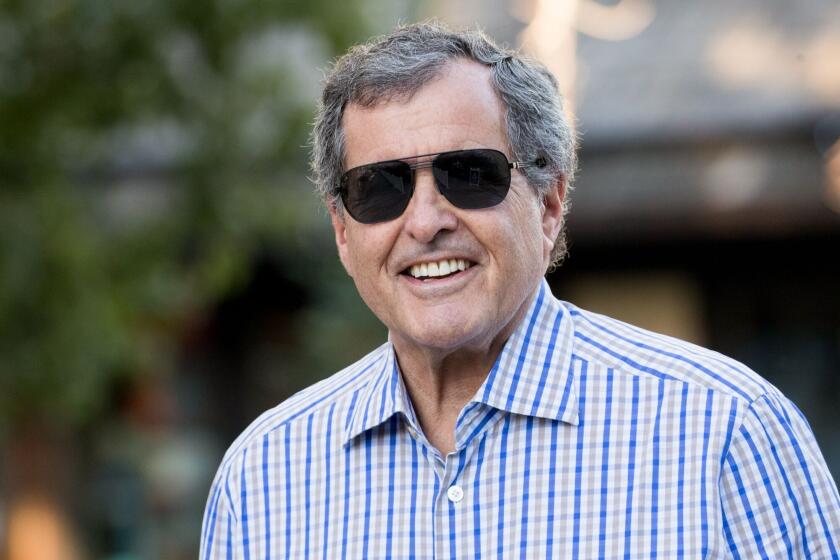In ‘Flattening’ Management Rolls, GE Chief Hopes to Shape Agile Giant
- Share via
John F. Welch Jr. has been preaching a fire-and-brimstone gospel of change since he became chairman of General Electric Co. in 1981.
The business environment of the 1980s would confront corporations with unprecedented challenges--slower growth, fiercer competition and rapid technological change, he said in a speech to Wall Street analysts that year. GE’s top managers would have to push their divisions to the top of the pack or see them sold off or shut down, he said.
“The managements and companies in the ‘80s that don’t do this, that hang on to losers for whatever reason--tradition, sentiment, their own mangement weakness--won’t be around in 1990,” Welch declared.
A tumultuous seven years of takeovers, restructurings and spectacular business failures have vindicated Welch’s prophecy. Now Welch is recasting his message. It’s not that his fundamental views are changing; he said in a recent speech that the 1990s “will be a white-knuckle decade for global business--fast, exhilarating, with sudden falls for many and victory for others.”
Rather, Welch is refining his pitch, hoping to simplify it to the point that it can be easily understood at every level of GE’s 300,000-employee empire. “The message is consistent, but hopefully it’s simpler now,” Welch said in a rare interview. “Hopefully, it keeps getting clarified.”
Spreading Managers Thin
The points Welch wants to get across sound simple and logical--but in some cases they also sound nearly impossible.
He wants the company to be strong and lean at the same time. He is continuing to thin out GE’s bureaucracy to leave as few layers as possible between top management and the workers who deal directly with customers and research and production. He wants managers to spread themselves deliberately thin--forcing them to hand off trivial decisions to subordinates so that they can concentrate on more important issues. And he wants managers to feel they have the freedom to make important decisions about how to mold their businesses to the fast-changing world around them.
In doing all this, Welch hopes to create a corporation that both embodies and defies a management paradox: a gigantic company--GE is the nation’s sixth-largest industrial corporation--that has the agility and flexibility of a small one.
“We like to think of trying to become a big company and a small company simultaneously. That literally is the message that we’re trying to get across,” Welch said. “This whole idea of broadening out the organization, flattening it more, doing all these things, should free people up. It should also say to people, ‘You can’t do some of the things you used to do.’ That’s the hardest part of the equation--getting people to understand that things have to fall off the truck. We can’t have a 1988 management philosophy with a 1966 management process.”
Welch’s continued success in getting his ideas to work at General Electric will be watched closely by much of the rest of corporate America, in part because of his reputation as a management sage and in part because General Electric long has been a leader in management theory. GE’s tightly wound system of planning and management controls, developed in the 1950s and ‘60s, is still the model for many major companies.
Search for Buzzwords
Welch’s seven years at GE have been marked by changes within the company as profound as those the chairman saw around it. GE has cut away dozens of businesses deemed not to be performing up to snuff, and--more significantly--has cut loose 100,000 employees even while its annual revenue has nearly doubled, to an expected $40 billion this year.
Welch is by no means alone in his search for a leaner, more efficient corporate stance. Those have become perhaps the two most important buzzwords of management in the 1980s.
But after finding that some of the more popular phrases didn’t really mean anything to some GE employees, Welch is searching for different buzzwords that get the message across even more clearly. Given the influence of Welch and GE on other American chief executives and corporations, any success he has in finding a better way to express himself likely will be adopted elsewhere.
The changes in the message Welch is trying to send is the result of what he has heard back from the organization. “We’re pounding back some of the things that we’re hearing. I think it’s a feedback system,” Welch said. “I’ve been playing with this thing. We’ve been wrestling with communicating better. . . . Let’s face it, the hardest thing in an institution is to get everyone to understand.”
As an example, Welch cites one of the most common management cliches of the past few years--the idea that a low-level manager could be given enough responsibility and independence that he or she could get the feeling of “ownership” of a business, much like an entrepreneur running a small, independent company. “Ownership” is a theme that has been at the center of Welch’s message for most of the past seven years. The problem, in a company as big as GE, is that ownership seemed a strange concept.
“People literally were puzzled by the word,” Welch said. “Every year in the annual report we were saying we were driving ownership down (through the company). Well, there was somebody down there saying, ‘You’re driving ownership down? Where is it?’ ”
Question of Freedom
Now, instead of “ownership,” Welch wants GE’s managers to think about whether they feel “liberated” or “free.” It’s a subtle distinction, but an important one, he said.
“People would say, ‘I don’t really own it. Down low in the organization I don’t feel it,’ ” Welch said. “But now we can ask them an even simpler question: ‘Are you freer to do more things? Is your job more exciting, more challenging than it was a year ago or two years ago?’ That’s more understandable than, ‘Do you feel ownership?’
“We’re trying to say, ‘Take charge of your actions,’ ” he said.
To get the message across, GE officials are circulating reprints of a speech Welch made at the company’s annual stockholders last month. Titled “Managing for the Nineties,” the speech lays out his current vision for the company much as his 1981 speech to analysts did for the 1980s.
“We can say without hesitation that almost every single good thing that has happened within this company over the past few years can be traced to the liberation of some individual, some team or some business,” Welch told shareholders. “So we reduced the number of management layers in the company to get closer to the individual--the source of that creative energy we needed.”
The idea of “delayering” has long been a key part of Welch’s management philosophy, although--in keeping with his effort to simplify his terminology--he now speaks of attempting to create a “flat” management structure, with a minimal number of management layers.
GE can quantify its success in this area. When Welch chopped the top layer of corporate management, known as “sectors,” off the organizational chart a few years ago, he saved the company $40 million in administrative costs. By removing other layers, Welch hopes to provide more leeway and recognition to star performers who otherwise would have been lost in the bureaucracy.
Driving Titles Out
“Some of the success with delayering that we’ve done works so well, like the sector elimination. We are so excited about what it’s done for us,” he said in the interview. “It’s really put the spotlight on our top people. . . . They have their own businesses; they’re captains of their game. Their self-confidence is growing.
“We’re now down in some businesses to four (layers) from the top to the bottom,” Welch said. “That’s the ultimate objective. We used to have things like department managers, section managers, subsection managers, unit managers, supervisors. We’re driving those titles out.”
Welch himself is affected by this. With the reduction in layers of top management, he now has several of GE’s key businesses reporting directly to him--including its fast-growing medical systems subsidiary, its major appliance business and the NBC broadcasting division.
“We used to go from the CEO . . . to sectors, to groups, to businesses,” Welch said. “We now go from the CEO . . . to businesses. Nothing else. There’s nothing else there. Zero.”
In flattening GE’s management structure, Welch also hopes to broaden the responsibilities of GE’s managers by increasing their “span,” or the number of people who report directly to each manager. “When we look at people,” he said, “we’re asking them (to) come in (and) tell us, ‘How many people from you to the plant floor? How many people in the engineering lab from you to the lab technician? How many in marketing to the sales person? What’s your span? Is it six? Or is it 11? Is it 13, your average span? Let’s get it to 20. . . . Let’s get it wider.’ ”
The reason for such broadening is simple, he said: By stretching their responsibilities, he wants to force managers to discipline themselves to have to deal with key decisions rather than small bureaucratic ones.
“Basically, we’re trying to get at the issue of dropping the trivia. That’s still the hardest thing to do,” he said. “If you’re managing three people, you’re not busy. You’re bothering them too much. I have the view that a busy executive overstretched is the best, because there’s no time for trivia. There’s no time to go nit-picking. There’s no time to go bother. If you’ve got three people working for you, you’ll be out there looking over their shoulders. . . . That’s the whole theory of it all: Keep stretching it horizontally and dropping off trivia--and work on big stuff.”
Formula for Quality
Welch also says he believes that by giving managers and workers increased responsibility at lower levels down the organizational chart, the quality of decision-making--and work in general--improves.
“I think people take more responsibility for their actions when they’re the last signature,” Welch said.
More to Read
Inside the business of entertainment
The Wide Shot brings you news, analysis and insights on everything from streaming wars to production — and what it all means for the future.
You may occasionally receive promotional content from the Los Angeles Times.











